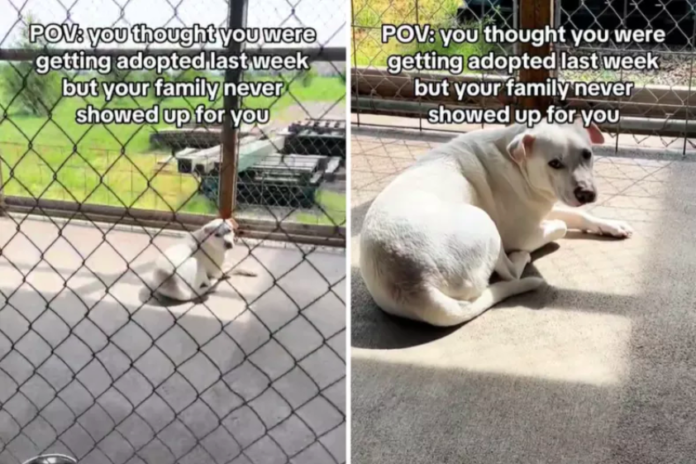Last Updated on August 5, 2024 by Fumipets
Face of a Dog After Potential Adopters Bailed Out on Him Breaks Hearts
In a heart-wrenching story from the Livingston County Humane Society, a shelter dog named Zare thought he had finally found his forever home. Unfortunately, his joy was short-lived when the potential adopters failed to show up on the designated pickup day. This emotional incident has captured the hearts of many, highlighting the ongoing struggles faced by shelter animals.
Zare’s Story: A Heartbreaking Twist
A Promising Beginning
Zare, a nearly 4-year-old Lab mix, was transported to the Livingston County Humane Society in Rowe, Illinois, about six months ago. Although little is known about his life before arriving at the shelter, it was evident that Zare was eager for a fresh start. The shelter staff described him as the “SWEETEST boy,” who loves giving endless hugs and kisses and enjoys both running and cuddling up with his person.
The Day of Disappointment
In May, the Livingston County Humane Society shared a video on TikTok under the username @livcohumane, showing Zare lying down in his kennel, looking miserable after his potential adopters failed to show up. The video caption read: “POV: you thought you were getting adopted last week but your family never showed up for you.” This poignant clip quickly went viral, garnering over 19,400 views and 1,883 likes.
Community Support
The emotional video drew numerous supportive comments from TikTok users. One user, Figham, pleaded, “Illinois please help you must have a loving person that can love this baby please.” Another user from the UK, User3486313625530, expressed their sympathy: “Poor baby I would have you in a heartbeat but I’m in UK crossing paws hoping you get adopted soon.”
Shelter Statistics and Challenges
The Shelter Reality
According to the American Society for the Prevention of Cruelty to Animals (ASPCA), approximately 6.3 million pets enter U.S. shelters annually, averaging 17,260 pets per day. In January 2023 alone, pet shelters took in 46,807 dogs and cats, an increase of 1,744 from January 2022, as reported by 24Petwatch’s Shelter Watch Report.
Reasons for Surrender
The Humane Society of Macomb in Michigan identifies several common reasons for dog surrenders, including age, allergies, behavioral issues, cleanup, cost, moving, new pets, and shedding. These factors contribute to the overwhelming number of pets in shelters and the challenging task of finding them forever homes.
Euthanasia and Adoption Efforts
Annually, around 920,000 surrendered animals are euthanized in the U.S. Shelters are actively working to reduce this number by promoting adoption campaigns, spaying and neutering programs, and behavior rehabilitation initiatives. The goal is to provide every shelter animal with a chance at a new life, just like Zare deserves.
Zare’s Hope for a Forever Home
A Sweet and Loving Companion
Despite the setback, Zare remains a hopeful and loving dog. The Livingston County Humane Society continues to promote his adoption, emphasizing his affectionate nature and ideal fit for a family that enjoys both outdoor activities and cozy cuddle sessions.
How to Help
The shelter encourages those interested in adopting Zare or any other shelter animal to visit their facility and meet the pets in need of homes. Sharing Zare’s story on social media and spreading awareness about the importance of adoption can also make a significant impact.
The Power of Social Media
Raising Awareness
The viral TikTok video featuring Zare’s heartbreaking experience has not only brought attention to his plight but also raised awareness about the broader issues faced by shelter animals. Social media platforms play a crucial role in connecting potential adopters with pets in need and encouraging community support.
Engaging the Community
By engaging with the community through comments and shares, shelters can create a network of advocates who are dedicated to finding loving homes for animals like Zare. This collective effort can lead to more successful adoptions and a decrease in the number of pets facing euthanasia.
Conclusion
Zare’s story is a poignant reminder of the emotional challenges faced by shelter animals and the importance of adoption. While his potential adopters may have bailed out, there is still hope that Zare will find the loving family he deserves. By raising awareness, supporting local shelters, and considering adoption, we can all contribute to giving shelter animals like Zare a chance at a better life.
Frequently Asked Questions (FAQs
1. How can I adopt a dog like Zare?
To adopt a dog like Zare, visit your local animal shelter or humane society. You can meet the available pets, learn about their personalities, and find the perfect match for your family. Many shelters also have websites with profiles of adoptable animals.
2. What should I consider before adopting a dog?
Before adopting a dog, consider factors such as your lifestyle, living situation, and ability to provide for the pet’s needs. Ensure you have the time, resources, and commitment to care for a dog throughout its life.
3. How can I support animal shelters?
You can support animal shelters by adopting pets, volunteering your time, donating supplies or money, and spreading awareness about the importance of adoption. Sharing stories like Zare’s on social media can also help connect shelter animals with potential adopters.
4. Why do people surrender their pets?
People surrender their pets for various reasons, including age, allergies, behavioral issues, cost, moving, new pets, and shedding. Understanding these factors can help address the root causes and improve pet retention rates.
5. What is being done to reduce euthanasia rates in shelters?
Shelters are working to reduce euthanasia rates by promoting adoption campaigns, implementing spaying and neutering programs, and providing behavior rehabilitation for animals with issues. These efforts aim to increase the number of successful adoptions and improve the overall well-being of shelter animals.
References: Newsweek Article


















